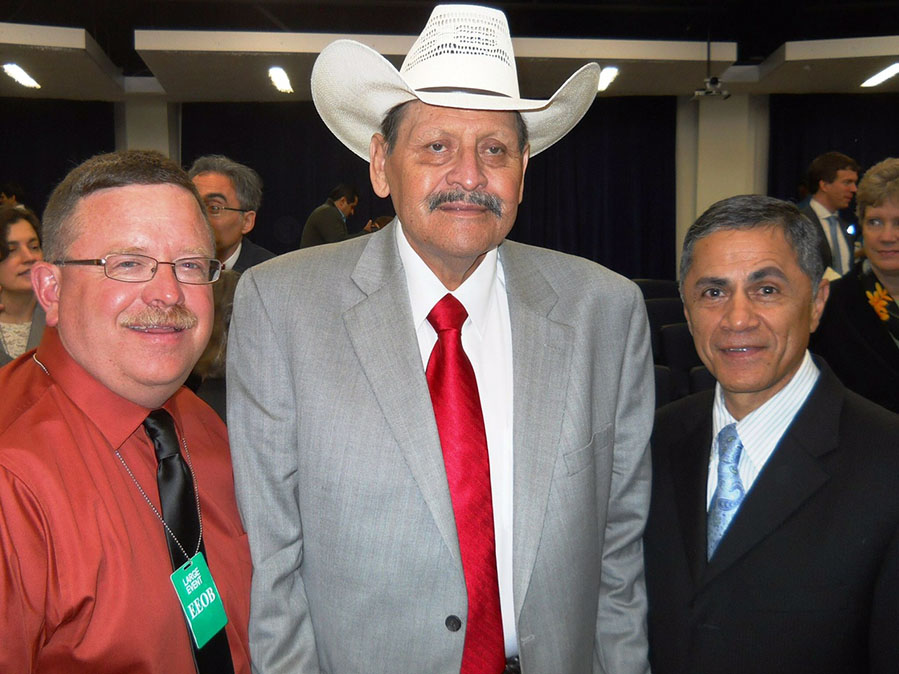- Home
- Administration
- Aeronautics
- Business with WYDOT
- Construction Projects
- Driver License and Records
- Economic Stimulus Projects (ARRA - TIGER)
- Engineering and Technical Programs
- Fuel Tax
- Highway Safety
- Human Resources
- Manuals and Publications
- News and Information
- Permits
- Planning/Projects/Research
- Titles, Plates and Registration
- Travel
- Trucking / Commercial Vehicles
- Vehicle Business Regulation
- Wyoming Highway Patrol
- Search
- Sitemap
Tribal transportation leader Big John Smith dies
January 4, 2017
Big John Smith, Director of the Eastern Shoshone/Northern Arapaho Tribal Transportation Department for the past 27 years, died Saturday, Dec. 31, 2016, in Casper following a short illness.
A rosary service and viewing is scheduled for 7 p.m. Tuesday, Jan. 3, at Blue Sky Hall in Ethete, with a wake following at Smith's residence, 161 Johnstown Valley Road near Kinnear. Funeral services are at 10 a.m. Wednesday, Jan. 4, at Blue Sky Hall, and burial will follow in the Aragon Cemetery in Kinnear. A feast and giveaway is scheduled to begin at Blue Sky Hall following burial.
Smith, who celebrated his 68th birthday on Dec. 8, is survived by six children -- Joanna Smith, Bryce Smith, Amy Smith, Fawn Smith, Dawson Smith and Avery Brown -- and many grandchildren, nieces, nephews, family members and friends. He was preceded in death by his parents, Alexander Smith Sr., and Ellen Julia (Aragon) Smith.
In the past 13 years, Smith was responsible for helping the Wyoming Department of Transportation reconstruct the Kinnear bridge on Wyoming 132 after a high-speed triple fatality crash damaged the old steel truss bridge, reconstruct the Hudson-St. Stephens highway (Wyoming 138), reconstruct to finish rebuilding 17 Mile Road (once called Wyoming 137) on the Wind River Reservation, reconstruct Wyoming 789 past the Wind River Casino to five lanes, and construct turning lanes and turning lanes and acceleration lanes at the Shoshone Rose Casino.
At the time of his death, Smith and his assistant transportation director, Howard Brown, were working with WYDOT to rebuild Blue Sky Highway (Wyoming 132) between Ethete and U.S. 287 north of Lander.
Until his death, Smith remained an unrelenting advocate for pedestrian safety, law enforcement and improved bridges and roadways on the Wind River Reservation, and his efforts are saving lives.
The completion of the 17 Mile Road reconstruction project was especially noteworthy in that it was once considered by many to be the most dangerous highway in Wyoming. Thanks to the collaborative nature of the work between WYDOT, Tribal Transportation (led by Big John and Howard Brown and Eastern Shoshone and Northern Arapaho tribal councils), and a federal TIGER (Transportation Investment Generating Economic Recovery) grant, the entire length of the highway and two bridges were rebuilt to today's Federal Highway Administration standards. One of the highlights of the project was construction of an interpretive pullout on 17 Mile Road recognizing the Sand Creek Massacre; the Sand Creek Massacre Trail runs between Ethete and Colorado.
Due largely to the skillful diplomacy of Big John Smith, the Joint Tribal Business Council, Bureau of Indian Affairs and the Federal Highway Administration, 17 Mile Road and the Hudson-St. Stephens highway are now tribally-owned and maintained roadways, because WYDOT transferred ownership of the two roadways to the Bureau of Indian Affairs following completion of construction.
Smith's dedication to improved highway safety of "his people" has been nothing short of amazing. Smith and Howard Brown of Tribal Transportation have continued to work with WYDOT, the Bureau of Indian Affairs, and the Joint Tribal Business Council to this day to continue to improve tribal traffic safety on the Wind River Reservation. The last major highway reconstruction effort is a result of the collaborative effort (the Wyoming 132/Blue Sky Highway Project), and it will link Ethete to the new Mill Creek Elementary School, Wyoming Indian High School, and U.S. 287, north of Lander.
Due to Smith's dedication to highway safety, three highway safety summits have been held on the Wind River Reservation in the past 10 years. Dramatic changes in the reservation law enforcement code and improved highway safety have been the results. Traffic safety has been enhanced, the transportation work on Wind River has been recognized nationally.
Smith worked tirelessly for decades on behalf of Wind River Reservation people in Wyoming and Native people from across the United States to improve the transportation infrastructure on Indian Reservations. He was well known in local, statewide and national transportation circles for his friendship, leadership, jokes and positive spirit until the final day of his life.
To this end, President Barack Obama and Transportation Secretary Anthony Foxx awarded Smith with a national Champions of Change Transportation Honor several years ago at The White House.
In his younger days, Smith played basketball at Pavillion High School and Central Wyoming College. He was a 1969 graduate of Pavillion High School, which later became Wind River High School. Smith was very proud of Wind River High School's 2015 state boys basketball championship.
Smith will be sorely missed by a legion of friends, co-workers, family members and tribal people. He will be remembered as a "big man, figuratively and literally," a leader in helping to modernize tribal roads and bridges, an advocate for tribal traffic safety, an all-around great man, a family man, and a supportive friend to those who were privileged to know and work with him. His sense of humor was legendary on the Wind River Reservation, and his work helped people. Big John's death truly marks the end of an era in transportation on the Wind River Reservation and across the country, but his dedication and legacy will be carried by future tribal leaders and generations who share his resolve of making the Wind River Reservation and other reservations safer places for everyone.
Photograph is of Smith, Cody Beers of WYDOT and Victor Mendez, the 18th administrator of the Federal Highway Administration. The photograph was shot at The White House in 2014 when Smith was recognized with a White House Champions of Change Award for his extraordinary transportation work on the Wind River Reservation.
--
Cody Beers
WYDOT Public Relations Specialist
(307) 856-1341 (office)
(307) 431-1803 (cell)
cody.beers@wyo.gov
@d5pio









